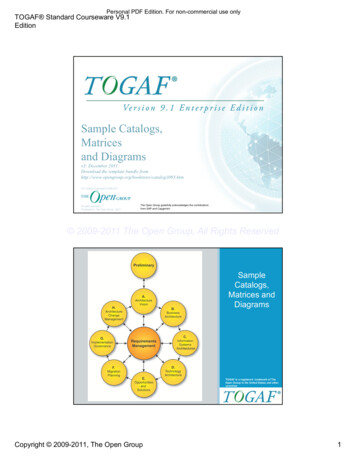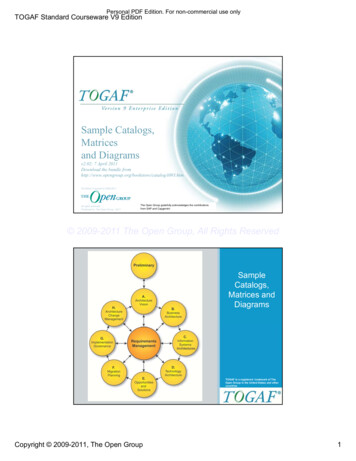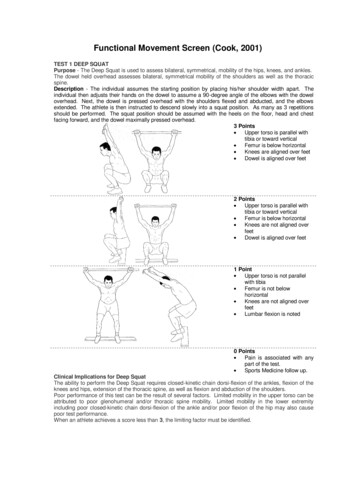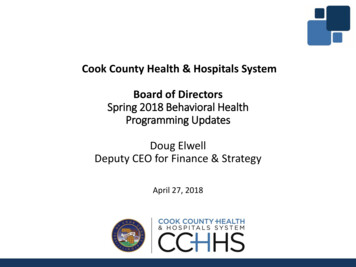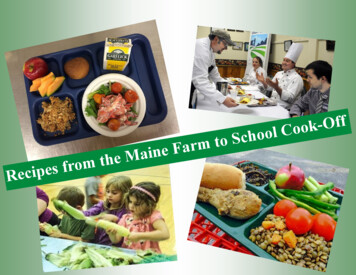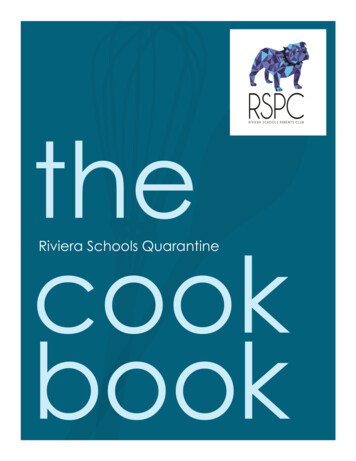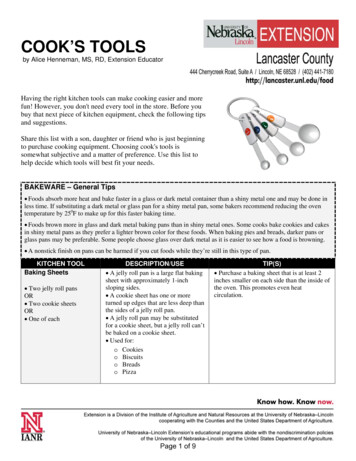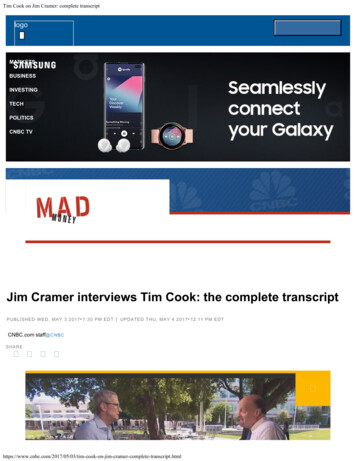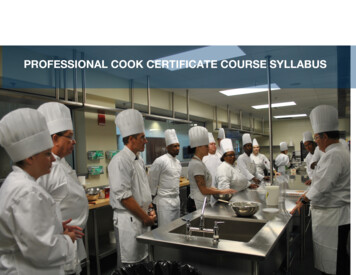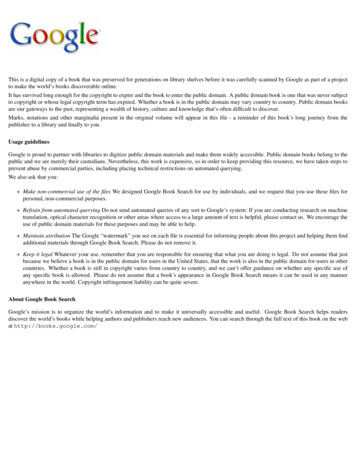
Transcription
COOKCOLLEGEInformation on the following subjects may be found inthe General Information section at the back of this catalog:Student Life and Services, Admission, Tuition and Fees,Financial Aid, and University Policies and Procedures.Web Site: http://www.cook.rutgers.eduHistory and Aims of the CollegeAcademic Policies and ProceduresDegree RequirementsPrograms of StudyCourse ListingAdministration, Centers, and Faculty270271275280336358269
History and Aimsof the CollegeThe Land-Grant CollegeRutgers’ Cook College is the land-grant college of Rutgers,The State University of New Jersey. Directly descendedfrom the Rutgers Scientific School, the original land-grantunit at Rutgers, Cook College was created in 1973 and designated a professional school in 1982. It is named in honorof George Hammel Cook (1818–1889), a renowned geologistand teacher at the Rutgers Scientific School. Cook College isclosely aligned with Rutgers’ other land-grant component,the New Jersey Agricultural Experiment Station/RutgersCooperative Research and Extension (RCR&E), the statemandated research and outreach arm of the university.Undergraduate programs are designed to promote thestudy of challenges facing society in the areas of agricultureand food systems; environment and natural resources;food, nutrition, and health; and human and communitydevelopment. Faculty members from Cook College andRCR&E pursue mission-based teaching, research, and outreach to solve problems faced by the people of New Jersey,and challenge students to adopt the same mission-basedapproach to their educational experience at Cook College.Often, teaching, research, and outreach are done in collaboration with faculty members from various departments, centers, and institutes from throughout theuniversity and beyond. Cook College students have notonly access to quality classroom experiences, but also theopportunity to participate with faculty in world-classresearch projects funded by major funding agencies, including the National Institutes of Health and the United StatesDepartment of Agriculture. Through Rutgers CooperativeResearch and Extension, Cook College students have theopportunity to work with faculty members throughout thestate, who are applying Rutgers’ research to address localneeds.Curricula and Professions in Agricultureand Food SystemsAt Cook College, the scope of agriculture includes cuttingedge scientific research that is the basis for the new agriculture. Cook College students are learning how to breed newplant species that have pharmaceutical applications, how touse biotechnology to ensure that future generations willhave enough to eat, and how to market agricultural products in the global economy. Graduates of agriculture-relatedmajors work in many different fields, such as animal production and management, sales, research, or health care.Others pursue careers in research laboratories of majorpharmaceutical and toxicology-related industries, many ofwhich are located in New Jersey. The preveterinary medicine and research option within the animal science majorprepares Cook College students to apply to veterinary colleges, enter medical and dental schools, or pursue graduatestudies leading to advanced degrees.270Curricula and Professions in Environmentand Natural ResourcesCook College students receive a solid foundation in science,one that will enable them to help develop the environmental solutions for tomorrow. Environmental sciences majorslearn to apply biological, chemical, and physical sciences toproblems in the environment. Marine sciences majors concentrate on the study of the marine environment and itsinteractions with the earth, the biosphere, and the atmosphere. Ecology and natural resources majors learn aboutnatural living systems and how they can be managed toprovide benefits to people. The environmental planningand design and the environmental policy, institutions, andbehavior majors pay particular attention to the interactionbetween natural and social systems. Environmental andbusiness economics majors learn to apply economic concepts to the analysis of policy issues. Graduates in theseand other environment and natural resources-related programs enter graduate schools or embark on many successful professional career paths. Opportunities include careersin government, education, consulting, or employment withlandscape architecture, architecture, engineering, and planning firms.Curricula and Professions in Food, Nutrition,and HealthStudents in the food science major, the only such majoroffered in New Jersey, study the chemical, biological, andengineering aspects of food and also learn about the latestinnovations and ethical issues in foods and food processing. Options within the major prepare students for graduate study and for various careers in the food industry. Thenutritional sciences major provides students with a strongbackground in the biological, biochemical, physiological,clinical, behavioral, sociological, and psychological dimensions of human nutrition. Options within the major canprepare students for the Registration Examination forDieticians, an opportunity that is available at no other college in New Jersey. The nutritional sciences program alsoprepares students for work in the food industry, and aftergraduate study, positions in cooperative extension, nutrition education, nutrition counseling, or clinical research.Nutritional sciences majors can also prepare themselves forgraduate study in the life sciences and medical, dental, andveterinary studies, as well as for immediate employment inthe biomedical industry.Integrated Curricula and ProfessionsMany programs of study at Cook College integrate discipline areas and can be applied to professions in severaldifferent fields. For example, the bioresource engineeringmajor teaches students to use the physical and biologicalsciences in solving problems related to plants, animals,food, wastes, and our natural environment. This programenables graduates to take examinations leading to a professional engineering license.The biotechnology major prepares students for the fieldof biotechnology, which is a key contributor to the advancement of agriculture, medicine, and environmental sciences.Students learn fundamental knowledge and laboratoryskills, including molecular biology, and establish a firm
foundation in biology and the physical sciences. CookCollege faculty members, who frequently form partnerships with pharmaceutical, biotechnology, food, environmental, and agricultural companies, are teaching theirstudents the skills that are in demand in industry.Undergraduates have ample opportunities to work inindustrial settings prior to graduation and, upon graduation, have the necessary skills to enter the biotechnologyfield. The program also prepares students for graduate andprofessional study in the life sciences.The Rutgers CommunityStudents at Cook College have the experience of living andlearning in a community where they are on a first-namebasis with their professors and classmates. They haveaccess to the 15 centers and institutes located on the Cookcampus and to the 9 off-campus research and extensioncenters operated by the RCR&E. In addition, because ofCook College’s partnerships with other units of Rutgersand beyond, students have access to faculty and facilitiesat many premier academic and research centers locatedthroughout the state. These include Rutgers’ Center forAdvanced Biotechnology and Medicine, the Environmentaland Occupational Health Sciences Institute, the W.M. KeckCenter for Collaborative Neuroscience, and the Universityof Medicine and Dentistry of New Jersey. Studentsalso have full access to services offered to all studentsat Rutgers.Academic Policiesand ProceduresNote: See also the University Policies and Proceduressection for regulations that pertain to all the undergraduatecolleges at Rutgers–New Brunswick/Piscataway.STUDENT RESPONSIBILITYTO KEEP INFORMEDIn addition to the contents of this catalog, important information about Cook College is contained in the Undergraduate Schedule of Classes (available from the Office ofAcademic and Student Programs), as well as the collegeweb site (http://www.cook.rutgers.edu). Students are responsible for maintaining contact with their academic adviserand keeping themselves informed of policies, procedures,and changes announced in these publications, sent to theiremail accounts, printed in Green Print as official notices,and posted on bulletin boards in the Office of Academicand Student Programs and the offices of the variousdepartments.Students also are responsible for checking their emailand Cook College Post Office (CPO) box, located in thePAL Building, on a regular basis. College and universitycorrespondence is mailed to the CPO and/or sent to thestudent’s campus email address.ACADEMIC CREDITAdvanced PlacementStudents may receive advanced placement credit for coursework taken at the secondary school level. All requests foradvanced placement credit should be forwarded to theOffice of University Undergraduate Admissions and arereviewed by the faculty members of the department concerned. Grades of 4 or 5 on the College Board AdvancedPlacement Examinations receive both credit and placementas determined by the respective department. Studentswho elect to take courses at or below the level for whichthey have received advanced placement credits will havethe advanced placement credits deleted from the computation of their total degree credits. Credit earned foradvanced placement is not included in the cumulativegrade-point average.During New Student Orientation, entering students aretested in mathematical and verbal skills. These examinations are used as guides in determining the proper mathematics and English courses for which a student shouldbe registered.271
Cook CollegeACADEMIC POLICIES AND PROCEDURESProficiency ExaminationsDistance Learning Course CreditWith the approval of the dean of academic and studentprograms (or designee), the student’s academic adviser,and the department concerned, a student may pay a feeand take a proficiency examination in certain coursesoffered by the university. Degree credit is given whenthe department evaluating the examination indicatesproficiency at a level comparable to passing the course.Proficiency examinations ordinarily are not allowed afterfailure in a course or in courses where the principal contentis laboratory or creative work, since the primary value ofthese courses lies in the student’s continuing and supervised participation.Cook College and Rutgers have entered into partnershipswith other colleges and universities to provide courses notavailable in New Brunswick/Piscataway. In some cases,students participate in the course(s) on the campus of thecollege offering the course. Other courses are offered onthe Internet.Courses offered in partnership with Rutgers andapproved by the appropriate faculty bodies are consideredRutgers courses, with university numbers, credits, andgrades. The grades for these courses are included in thestudent’s cumulative grade-point average.Other distance learning courses taken by the student areconsidered for approval according to the procedures followed for transfer credits.Transfer CreditA student who has transferred from another accreditedinstitution receives credit for all courses in which a grade ofC (2.000) or better was received. The courses need not conform to courses offered at either Cook College or Rutgersprovided they are not designated below the 100 (or remedial) level and are recognized as part of a student’s graduation requirements at the college from which the student istransferring. Grades from such courses are not included inthe student’s cumulative grade-point average. This regulation applies both to transfer credit granted at the time ofadmission and to any summer or special courses takenoutside of Rutgers while the student is a candidate for adegree at Cook College.University regulations require that at least 30 of the last42 credits must be completed at Rutgers.Credit will not be granted for courses taken at anotherinstitution during a period of disciplinary suspension fromthe university.Students may elect to remove courses taken at Rutgersas nonmatriculating students while enrolled in high schoolfrom the computation of their degree credits and cumulative grade-point average. Such courses and grades remainon the student’s transcript with an “E-credit” designationand do not fulfill college or program requirements.None of Cook College’s programs of study awards credits on the basis of College Level Entrance Program subjecttests administered by the College Entrance ExaminationBoard. CLEP subject tests may be reviewed by other university departments for course equivalency credit.An official transcript of all course work taken at otherinstitutions of higher learning is required whether or nottransfer credit is requested. Students should be awarethat since some programs at Cook College include coursesthat may be unique to the college, some transfer creditsmay be accepted as excess unspecified electives, resultingin the transfer student needing more than the minimumof 128 credits required for graduation. Matriculatedstudents wishing to take courses outside of Rutgers musthave prior approval from the Office of Academic andStudent Programs.The credits and grades for approved courses taken at anydivision of Rutgers while matriculating at Cook College(including specific courses taken under the auspices of consortium agreements with other colleges and universities)are included in the cumulative grade-point average.272REGISTRATION ANDCOURSE INFORMATIONAcademic AdvisingThroughout their matriculation at Cook College, studentsselect courses and develop their academic program in closeconsultation with an academic adviser. During the firstyear, students are assigned to an academic adviser. In allsubsequent years, students are advised by a faculty member in the student’s selected program(s) of study. Advisingnotwithstanding, students must assume full responsibilityfor meeting all curriculum and college requirements andfor being sure they have the proper prerequisites for anycourse for which they register. Students are encouraged tomeet with their advisers throughout the academic year.Cook College uses a system of adviser codes to aid inthe advising and registration process. Faculty advisers forupper-class students in each curriculum are indicated withthe major requirements in the Programs of Study chapter.The following is a list of those now serving as academicadvisers for first-year students.AdviserIleana D. AlmaguerTamar BarkayFaith C. BelangerDawn BrasaemlePenny CarlsonTheodore Chase, Jr.George F. ClarkDonn A. DerrLee Ann DmochowskiPaul FischbachFrager FosterBarbara M. GoffAl GomezJudith P. GrassleEdwin J. GreenRobert HarnackJean Marie HartmanRobert M. HillsBarry W. JesseSoo-Kyung LeeKarl MatthewsKenneth H. McKeeverJohn MuthSarah L. RalstonShanice RichardsonCarol M. RutgersLee D. SchneiderMarie 9)(35)(27)(46)(07)(17)(18)OfficeMartin 219Lipman 333CForan 304Thompson 133Martin 202Lipman 220COB 209COB 217Martin 220Loree Gym 110Martin 226Loree 038Perry HallIMCS 309CENR 158ENR 356Blake 226Martin 214Foran 108ADavison 212AFood Science 203Bartlett 003Martin 222Bartlett 209Martin 204Martin 211Cook CenterENR 240Phone (Ext.)2-3000 (531)2-9763 (333)2-8165 (346)2-65242-3000 (512)2-9763 (220)2-9153 (311)2-9155 (214)2-3000 (529)2-86002-3000 (530)2-92662-93632-6555 (351)2-91522-98412-67852-3000 (512)2-8165 (104)2-27662-9611 (219)2-93902-3000 (515)2-94042-3000 (512)2-3000 (523)2-94292-9804
Cook CollegeACADEMIC POLICIES AND PROCEDURESLeslie E. SmallPeter E. SmouseMikhail TchikindasTheodorus van EsDana E. VeronJames F. White(59)(37)(38)(61)(14)(50)Martin 211Waller 001Food Science 203Lipman 109ENR 227Foran 2632-3000 (510)2-11242-9611 (218)2-9763 (109)2-90812-9711 (357)RegistrationRegistration for matriculated students begins in Octoberfor the following spring term and in April for the followingfall term. Matriculated students register through theRutgers Touchtone Telephone Registration System (RTTRS)or the online web registration system (http://webreg.rutgers.edu).Registration is completed upon full payment of tuition andfees by the announced deadline prior to start of the term.The university reserves the right to restrict registration inall courses offered and, when necessary, to cancel coursespreviously announced. The university also will cancel astudent’s registration for late payment of term bills or foroutstanding debts to the university. See the Tuition andFees section for further information on registration.Change of Courses. See the University Policies andProcedures chapter for drop/add procedures. Students areresponsible for knowing the dates as well as proceduresfor changing their registration in a given term.Course LoadFull-Time Status. A full-time matriculated student mayelect to take from 12 to 19 credits of course work per term.No exceptions to this general rule are made without theapproval of the student’s academic adviser and the deanof academic and student programs (or designee).Part-Time Status. A continuing student may matriculateon a part-time basis with the approval of the dean of academic and student programs (or designee) and the academic adviser. A student applying to matriculate at CookCollege for the first time must apply as a full-time student.Withdrawal and ReadmissionWithdrawal. Students who wish to withdraw from thecollege should consult their faculty adviser and one of thedeans in the Office of Academic and Student Programs.After the interviews, the student must fill out a withdrawalform stating the reasons for withdrawal and submit thewithdrawal form to the Office of Academic and StudentPrograms. Withdrawal by mail is possible only when illnessprecludes the possibility of interviews. Students who leavethe college without officially withdrawing receive a gradeof F in each incomplete course. Official withdrawal fromthe college with grades of W in all courses is not grantedafter the 12th week of the term except in cases of extremeextenuating circumstances (such as serious illness) andwith the approval of the Admissions and ScholasticStanding Committee. Students are responsible for knowingthe procedures and deadlines for withdrawal from the college or from particular courses.Readmission. Any matriculated student who withdrawsor takes a leave of absence from college may apply forreadmission to the Admissions and Scholastic StandingCommittee at Cook College. Readmission customarily isapproved for students who submit the application at leasttwo weeks prior to the beginning of the term in which theywish to return. Readmission applications are available inthe Office of Academic and Student Programs, Martin Hall,second floor.For the college’s policy on readmission after dismissalfor academic reasons, see Scholastic Standing later inthis chapter.Students who have graduated from Cook College mayapply for readmission for one year to take additionalundergraduate courses as nonmatriculated students inorder to enhance employment opportunities, to completerequirements for academic certification, or to take coursesthat are required for application to a graduate program.Cook College students also may apply for readmissionto complete a second Cook College bachelor’sdegree program.Course InformationGraduate Courses. Undergraduates with senior standingand a cumulative grade-point average of at least 3.0 maytake graduate courses with the approval of the graduateinstructor or the director of the graduate program offeringthe course, the administrator of the school offering thecourse, and their faculty adviser. Forms for requestingpermission are available in the Office of Academic andStudent Programs.Pass/No Credit Courses. Certain courses are offered ona Pass/No
The biotechnology major prepares students for the field of biotechnology, which is a key contributor to the advance-ment of agriculture, medicine, and environmental sciences. Students learn fundamental knowledge and laboratory skill
